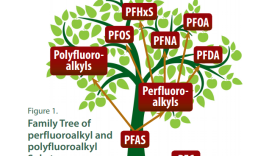Scientists and toxicology experts say PFAS chemicals known to affect the immune system could impact the efficacy of a COVID-19 vaccine. While the link has not yet been cemented, they are concerned that communities with high exposures to PFAS may be more vulnerable during the pandemic.
Dr. Jamie DeWitt is associate professor of Pharmacology and Toxicology at East Carolina University.
“What we understand then about COVID and PFAS on the immune system is that people with higher levels of PFAS in their blood are at increased risk of immunotoxicity,” DeWitt says.
Dr. Linda Birnbaum is former director of the National Institute of Environmental Health Sciences and National Toxicology Program.
“My National Toxicology Program released in 2016 a systematic review, which concluded that the legacy PFAS, the PFOA and the PFOS, did, were immunotoxic,” Birnbaum says.
During a virtual press briefing Thursday, DeWitt said she cannot cement a link between the effects of PFAS and COVID or the impact on people with higher levels of PFAS in their systems and the effectiveness of a COVID vaccine. These are all under study.
“I think that the risk is real, but we can’t put definitive numbers on those risks right now,” says DeWitt says.
Birnbaum adds:
“There is certainly, conceptually, the, from everything that we know about these chemicals, we know that they do suppress the immune system as well as stimulate it, in certain cases. We know that if you have higher levels, you’re more likely to have that suppression happening, and we know that suppression of the immune system can be associated with a decreased ability to mount a therapeutic response to vaccination,” Birnbaum says. “That doesn’t mean you don’t get any response to vaccination; you may just not get as much. So there may be opportunities that if you’re living in an area, for example and you know that you have high PFAS, there may be opportunities; maybe that instead of getting that one booster that’s now required with the two mRNA vaccines, that maybe you would need a third booster.”
Birnbaum says PFAS chemicals cause a number of adverse health effects, including on the thyroid and pancreas. They can be toxic to the liver and the kidneys, are linked to kidney and testicular cancer and impact the immune system, among other effects. Dr. Tasha Stoiber is senior scientist with the Environmental Working Group.
“We know from studies in people and laboratory animals that the immune system is especially vulnerable to PFAS exposures, as you’ve just heard. And in the context of this pandemic, PFAS in your body, it may not only affect your risk of developing severe illness from COVID, but, as you’ve heard, it could also affect your body’s response to a vaccine,” Stoiber says. “I want to stress again that it will be critical for as many people as possible to be vaccinated to end the pandemic. And it might be important for those that do have higher PFAS in their bodies to be prioritized to be vaccinated because they do have this increased risk of severe illness.”
Birnbaum responded to a question about whether residents of communities with known PFAS contamination, like Hoosick Falls and Newburgh, New York, should be considered for priority preference in receiving the COVID vaccine.
“That’s really a major public health question. I think that we don’t know. There are a number of spots where we know we might have elevated PFAS but there are lots of areas that will have elevated PFAS that we don’t know. EWG [Environmental Working Group] now estimates that over 200 million people in the U.S. are drinking water contaminated with PFAS, and that’s just one source,” says Birnbaum. “So I think following the recommendations that healthcare workers and residents and caretakers in nursing homes are among the first is a very appropriate scheme for the vaccination response. And I think all of us are very eager that we fall in line and know where our priority will be as soon as possible, And, of course, every state is prioritizing, within some general guidelines, quite differently.”
Again, DeWitt:
“But even though we know that some people have some concentrations of PFAS, such as PFOS, that are immunotoxic, we still want people to get vaccinated because that vaccine is going to give your immune system an additional tool to fight COVID and, with other vaccines, other types of pathogens,” DeWitt says. “So it’s like giving somebody who’s fighting a battle a weapon.”
And, she says, give them a chance in their battle against COVID. Environmental Working Group Legislative Attorney Melanie Benesh points to a bigger picture.
“The global COVID-19 pandemic has really underscored the importance of having healthy, functional immune systems. I think that’s clear to everyone,” Benesh says. “And because of the known links between PFAS chemicals and immune system harm, the federal government should be doing everything possible to reduce our exposure to PFAS chemicals, and, broadly, that means taking action to reduce industrial discharges into the environment; ending any nonessential uses of PFAS and eliminating that exposure route; cleaning up all of the existing pollution that has been in the environment for decades; and getting PFAS out of our drinking water.”
The Environmental Working Group hosted the press briefing.










